

F.D.A. Halts U.S. Sales of Pelvic Mesh, Citing Safety Concerns for Women. The disputes over the safety of pelvic mesh have gone on for more than a decade. Until Tuesday, the F.D.A. had never formally demanded that the products be taken off the market, but it had issued several warnings about the devices. The agency said earlier that it had received reports of more than 10,000 complaints of serious injury and nearly 80 deaths as of last year. Women who have already had the devices implanted and are not having problems with them should not take any action, other than to continue regular doctor visits, Ms. Kotz, the F.D.A. spokeswoman, said. It has been estimated that nearly 10 million women worldwide have received mesh implants to treat weakening pelvic muscles and alleviate urinary incontinence.
In light of the litigation, warnings and complaints from women about severe pain and bleeding from mesh implants, some manufacturers, including Johnson & Johnson, had voluntarily stopped selling them. FDA May Finally Do Something About Dangerous Medical Devices. Laparoscopic ventral mesh rectopexy for internal rectal prolapse. The F.D.A. Has Stopped the Sale of Pelvic Mesh Out of Safety Concerns. Takes action to protect women’s health, orders manufacturers of surgical mesh intended for transvaginal repair of pelvic organ prolapse to stop selling all devices. The U.S.
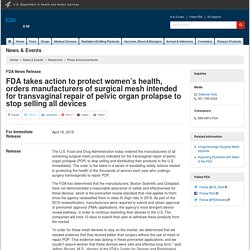
Food and Drug Administration today ordered the manufacturers of all remaining surgical mesh products indicated for the transvaginal repair of pelvic organ prolapse (POP) to stop selling and distributing their products in the U.S. immediately. The order is the latest in a series of escalating safety actions related to protecting the health of the thousands of women each year who undergo surgery transvaginally to repair POP. The FDA has determined that the manufacturers, Boston Scientific and Coloplast, have not demonstrated a reasonable assurance of safety and effectiveness for these devices, which is the premarket review standard that now applies to them since the agency reclassified them in class III (high risk) in 2016.
As part of the 2016 reclassification, manufacturers were required to submit and obtain approval of premarket approval (PMA) applications, the agency's most stringent device review pathway, in order to continue marketing their devices in the U.S. The FDA has years of hidden medical device incident reports and researchers want them released. General and Plastic Surgery Devices Panel Meeting Day 1. Experts Weigh Whether Vaginal Mesh Should Be Pulled From US Market. Women who suffered debilitating injuries and scientists who conducted clinical research for manufacturers have offered conflicting testimony on the safety of vaginal mesh before an expert panel convened by the United States Food and Drug Administration.
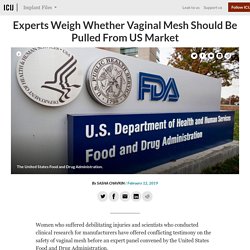
The panel is considering whether three vaginal mesh devices used to treat pelvic organ prolapse, a common women’s health problem, should be allowed to remain on the U.S. market. The FDA decided in 2016 that vaginal mesh should be considered among the riskiest class of devices after receiving thousands of reports of complications from women – and after companies made payouts of billions of dollars to settle lawsuits over complications and reoperations. Dr. Jacqueline Cunkelman, an FDA medical officer and obstetrician-gynecologist, told the panel that as of Sept. 30, 2018 the agency has received 11,274 adverse events reports for vaginal mesh to treat certain categories of prolapse. Boston Scientific researcher Dr.
FDA to revisit transvaginal mesh issues at February meeting. Dive Brief: FDA formally announced it will convene an advisory panel meeting on Feb. 12 to review surgical mesh devices for transvaginal pelvic organ prolapse repair.
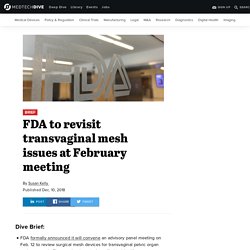
The meeting is part of an effort to identify concerns about the devices and strengthen regulatory oversight to protect patients, the agency said.Earlier versions of surgical mesh products were removed from the market after a history of adverse events, including malfunctions, injury and death. But FDA said it wants to enable those who need the devices to benefit from them.The committee will discuss and make recommendations regarding the safety and effectiveness of surgical mesh placed transvaginally in the anterior vaginal compartment to treat pelvic organ prolapse. The public, including patients, has an opportunity to comment and may submit input through Feb. 11 to the electronic filing system at Dive Insight: FDA said there are four studies ongoing for five devices. FDA advisory panel to mull transvaginal mesh - MassDevice. US FDA plans overhaul of decades-old medical device system - NEWS 1130.
VANCOUVER (NEWS 1130) – You may want to keep a close tab on your credit card information, especially if you’ve travelled.
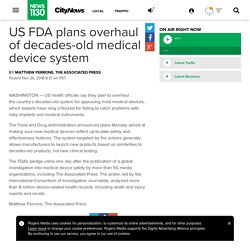
Up to 500 million people who stayed at hotels belonging to Marriott International may have sensitive personal information compromised. The company says it’s discovered unauthorized access within its Starwood network has been taking place for years — since 2014. The theft includes passport and credit card numbers, and even birthdays. It could be the second largest data breach in recent history, and one cyber security expert says it’s just another example of how we’re caught in a cycle. “With more and more large-scale organizations, especially the scale of variant, this is becoming a daily norm and is serving as an example that as consumers, we need to start holding these organizations more accountable,” says Cyber.sc Chief Security Strategist Dominic Vogel. He says it’s time for people to develop a taste for only the finest in data security. Privacy settings. Deze website maakt net zoals de meeste websites gebruik van cookies.

Via deze cookies verzamelen wij informatie over uw bezoek en interesses. Op deze manier is het mogelijk om onze inhoud blijvend gratis aan te bieden en een gepersonaliseerde website en relevante advertenties te tonen. Chirurgen getuigen over omkooppraktijken. Indications, Contraindications, and Complications of Mesh in Surgical Treatment of Pelvic Organ Prolapse. Nieuwe wetgeving van kracht voor alle medische hulpmiddelen in Europa - Bekkenbodem. Obstetrical and Gynecological Devices; Reclassification of Surgical Instrumentation for Use With Urogynecologic Surgical Mesh.
Obstetrical and Gynecological Devices; Reclassification of Surgical Mesh for Transvaginal Pelvic Organ Prolapse Repair. Start PreambleStart Printed Page 354 Food and Drug Administration, HHS.
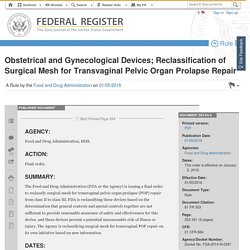
Final order. The Food and Drug Administration (FDA or the Agency) is issuing a final order to reclassify surgical mesh for transvaginal pelvic organ prolapse (POP) repair from class II to class III. FDA is reclassifying these devices based on the determination that general controls and special controls together are not sufficient to provide reasonable assurance of safety and effectiveness for this device, and these devices present a potential unreasonable risk of illness or injury. The Agency is reclassifying surgical mesh for transvaginal POP repair on its own initiative based on new information.
This order is effective on January 5, 2016. Start Further Info Sharon Andrews, Center for Devices and Radiological Health, 10903 New Hampshire Ave., Bldg. 66, Rm. End Further InfoEnd PreambleStart Supplemental Information I. On July 9, 2012, the Food and Drug Administration Safety and Innovation Act (FDASIA) (Pub. II. FDA 510(k) Clearance - Dangerous Fast-Track Approval Process. A spike in medical-device recalls in recent years has caused some to question the viability of the U.S.
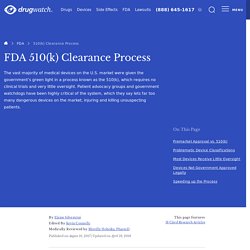
Food and Drug Administration’s medical-device clearance process, which one expert has labeled “the weakest and most nonsensical program in the FDA.” In the second half of 2016 alone, more than 180 million medical devices were recalled. Since 1976, all medical devices must be cleared by the FDA before they can be sold legally in the U.S., unless the agency has exempted the device from this requirement. In regulating medical devices, the FDA follows rules that are designed to focus on cost and benefit. The office that oversees device regulation and approval, the FDA’s Center for Devices and Radiological Health (CDRH), receives 50 percent of its funding from fees paid by manufacturers. CDRH oversees approximately 175,000 medical devices on the U.S. market, more than 18,000 medical device manufacturers and more than 25,000 medical-device facilities worldwide. Federal Whistleblower calls out FDA for allowing Medical Device industry to Off Label Promote.
Obstetrical and Gynecological Devices; Reclassification of Surgical Mesh for Transvaginal Pelvic Organ Prolapse Repair. In FDA Meetings, "Voice" of the Patient Often Funded by Drug Companies. This is part 2 in a series; read the first part, “DRUG MONEY: FDA Depends on Industry Funding; Money Comes with ‘Strings Attached’” At an August 15, 2016, public forum convened by the Food and Drug Administration, panelist Marc Boutin introduced himself as CEO of National Health Council and said his organization provides “a united voice for people with chronic disease and disabilities.”
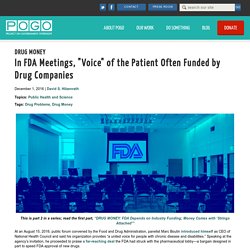
Speaking at the agency’s invitation, he proceeded to praise a far-reaching deal the FDA had struck with the pharmaceutical lobby—a bargain designed in part to speed FDA approval of new drugs. Boutin’s comments added credibility to the deal and wrapped it in the embrace of suffering patients, a group bound to evoke sympathy. But there were a few things neither Boutin nor his hosts at the FDA mentioned. FDA Is Pharmaceutical Industry's Lapdog, Not a Watchdog. By Dr.
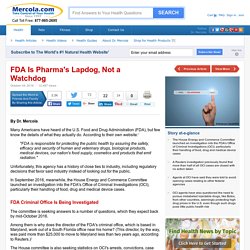
Mercola Many Americans have heard of the U.S. Food and Drug Administration (FDA), but few know the details of what they actually do. According to their own website:1 "FDA is responsible for protecting the public health by assuring the safety, efficacy and security of human and veterinary drugs, biological products, medical devices, our nation's food supply, cosmetics and products that emit radiation. " Unfortunately, this agency has a history of close ties to industry, including regulatory decisions that favor said industry instead of looking out for the public. MAUDE Adverse Event Report: JOHNSON & JOHNSON SURGICAL MESH. Patients Injured Seek Removal of FDA Device Center Director. Patients who have been injured by medical devices are moving to have Jeffrey Shuren, director of the Food and Drug Administration’s Center for Devices and Radiological Health (CDRH), fired.
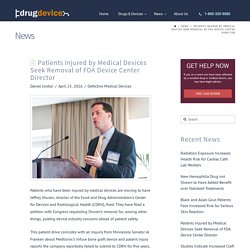
They have filed a petition with Congress requesting Shuren’s removal for, among other things, putting device industry concerns ahead of patient safety. This patient drive coincides with an inquiry from Minnesota Senator Al Franken about Medtronic’s Infuse bone graft device and patient injury reports the company reportedly failed to submit to CDRH for five years, according to Medical Device + Diagnostic Industry (MD+DI).
Franken’s complaints about CDRH’s management of patient safety issues and its post-market surveillance deficiencies came in the form of a three-page letter to the new FDA commissioner Robert Califf. Paula Cofer, Lasik surgery victim/activist and former CDRH advisory committee consumer representative, led the Internet petition drive. Safety is a shared responsibility: a 10-year review of surgical safety incidents in Canada. April 13, 2016 - Ottawa – The effectiveness and safety of surgery has steadily improved over the last many decades in Canada. There are now over one million surgical procedures performed annually. Nevertheless, despite the significant improvements in patient outcomes, patient safety incidents do sometimes occur.
A detailed review of medico-legal cases in Canada between 2004 and 2013 reveals that a large number are related to surgical care. FDA's official blog. Safety Alerts for Human Medical Products > Urogynecologic Surgical Mesh Implants by Boston Scientific: Notification – Potential for Counterfeit Raw Material. [Posted 04/01/2016] AUDIENCE: Surgery, OB/GYN, Risk Manager ISSUE: The FDA is aware of allegations that Boston Scientific's urogynecologic surgical mesh may contain counterfeit raw material. We are examining these allegations to determine any necessary and appropriate next steps. FDA is not currently aware that the alleged counterfeit raw material contributes to adverse events associated with these products. It is not uncommon for a firm, based on its own appropriate evaluation of potential suppliers and raw material, to change the source of a raw material after the device has been cleared by the FDA, and such a change often does not require FDA premarket review.
Obstetrical and Gynecological Devices; Reclassification of Surgical Mesh for Transvaginal Pelvic Organ Prolapse Repair. The Federal Food, Drug, and Cosmetic Act (the FD&C Act), as amended, established a comprehensive system for the regulation of medical devices intended for human use. Section 513 of the FD&C Act (21 U.S.C. 360c) established three categories (classes) of devices, reflecting the regulatory controls needed to provide reasonable assurance of their safety and effectiveness. The three categories of devices are class I (general controls), class II (special controls), and class III (premarket approval). Under section 513(d) of the FD&C Act, devices that were in commercial distribution before the enactment of the 1976 amendments, May 28, 1976 (generally referred to as preamendments devices), are classified after FDA has: (1) Received a recommendation from a device classification panel (an FDA advisory committee); (2) published the panel's recommendation for comment, along with a proposed regulation classifying the device; and (3) published a final regulation classifying the device.
Theconversation. A common surgery to treat vaginal prolapse using an artificially grafted mesh has more problems than benefits, our Cochrane review has found. Women who underwent the operation had high rates of needing repeat surgery due to mesh exposure, bladder injury and urinary incontinence. A vaginal prolapse occurs when the walls of the vagina become weak and collapse inwards. Women can feel a lump or bulge low in their vagina, which is exacerbated at times of physical activity. Use of Transvaginal Mesh Fell After Strongly-Worded FDA Safety Alert, Study Finds.
FDA Tightens Rules for Mesh Device Used in Some Pelvic Surgeries. The Food and Drug Administration is tightening regulations for surgical mesh products used to repair a condition known as pelvic organ prolapse, following years of scrutiny by the U.S. regulator and many lawsuits by women who allege they have suffered harm from such products. The products will be reclassified as high-risk rather than moderate-risk medical devices when used in procedures that go through the vagina to repair organ prolapse.
The FDA will require all manufacturers to submit data to support the effectiveness and safety of such devices before they are allowed on the market. Many of the available mesh kits were approved through an expedited review known as the 510(k) process, in which manufacturers need only demonstrate that a product is substantially similar to ones already on the market. Manufacturers with products currently on the market will have 30 months to comply with the new data requirements, the FDA said.
Write to Shirley S. FDA Issues High Risk Warning for Transvaginal Mesh. Strengthens requirements for surgical mesh for the transvaginal repair of pelvic organ prolapse to address safety risks. The U.S. Transvaginal Mesh Is the Stuff of Nightmares. Some Airbnb hosts unwittingly opened their doors to guests determined to celebrate the New Year with an excess of sex, drugs, and booze. Justine Smith didn’t really mind that the two people who were renting out a room of her Montreal apartment through Airbnb on New Year’s Eve were doing cocaine in her living room.
“We could hear people cutting the coke,” Smith told The Daily Beast, explaining she had a glass coffee table. FDA Finally Recognizes That Transvaginal Mesh Puts Women at a Painful Risk. Thanks to late-night law firm advertisements urging you to CALL NOW if you or a loved one has suffered from complications due to transvaginal mesh, the controversial medical device has become, at least by name, ominously ubiquitous.
Statement on FDA Regulation of Surgical Mesh - ACOG. January 4, 2016 Washington, DC — Hal C.